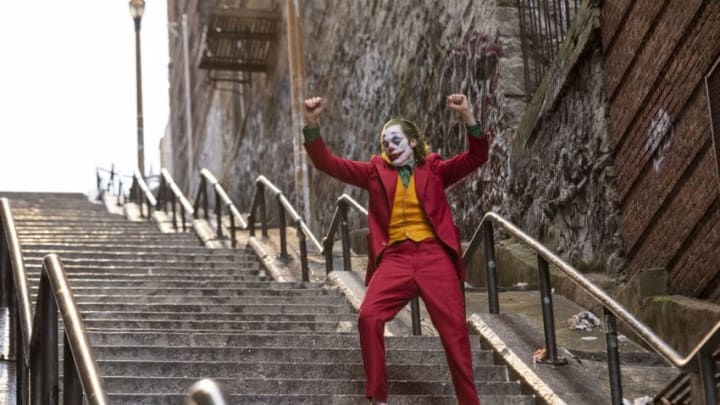Joker review: A highly problematic, albeit compelling, character study

Though Joaquin Phoenix’s performance is stunning, Joker suffers from a problematic narrative. Potentially contains minor spoilers.
With his face covered in clown makeup and blood, Arthur Fleck (Joaquin Phoenix) slumps against the wall. Having just brutally murdered someone, you’d expect to see him affected by his actions. Instead, he tranquilly talks about how he’s about to be featured on a talk show. And that is Joker in a nutshell. At points, the film simply ignores the impact of the bloodshed but, generally, it romanticizes Arthur for his violent actions.
Various critics have pointed out the potential dangers of a movie featuring a man driven to violence by the cruelty of the world. By the time the ending credits roll, it’s clear these concerns are entirely valid.
From start to finish, Joker sends a highly problematic message about mental illness and individuals who lash out in response to mistreatment. The distasteful image of a crowd applauding Arthur for murder is the most blatant evidence that the entire film is riddled with questionable narrative decisions.
Even if you take a step back and ignore these social issues, director Todd Phillips will leave you scratching your head at times. Phillips employs an unreliable narrator tool through the use of Arthur’s hallucinations – which is somewhat effective. However, including hallucinations in any story is a dangerous game.
Though the difference between reality and fantasy is obvious in some scenes, the line soon gets blurred, which makes it hard to tell what’s happening. These choices are especially perplexing given the film’s focus on highly contentious topics; if the events are happening in Arthur’s head, the violence feels even less impactful.
More from Movies
- James Gunn’s Superman: Legacy casts more major DC characters
- New Aquaman and the Lost Kingdom trailer pushes Arthur to his limits
- 7 actors who could replace Ezra Miller as The Flash in the DC Universe
- Masters of the Universe reboot’s new domain could be at Amazon’s Prime Video Streamer
- James Gunn gives interesting update of Superman and Supergirl movies at DC Studios
As comic book fans enter the theater, they’ll want to like this movie. After all, it’s about The Joker! It offers viewers a chance to see what the Clown Prince of Crime could look like in a world without Batman. While Joker was never going to be a typical comic book movie, that’s exactly what the genre needs right now.
Phillips presents a character-driven piece and, while responses to the film’s message will vary, fans can appreciate how the director skillfully ties in aspects of the Batman mythos. Wealthy Gothamite Thomas Wayne (Brett Cullen) is the villain in Arthur’s view of the world; because Thomas abandoned Arthur’s mother, Penny Fleck (Frances Conroy), he doomed the Flecks to a life of poverty. Thomas and the rich upper-class become an object of Arthur’s obsession and many Gothamites start an aggressive anti-rich movement in response to Arthur’s crimes.
The potential revolution sets off a chain of events that paves the way for a certain iconic scene, and the contextualization of this legendary moment in a city that’s rapidly decaying (and ripe for a Dark Knight’s arrival) is undoubtedly one of the best parts of the film.
Phoenix’s Arthur is another highlight. As the character continues to spiral, his compulsive laugh progressively grows more and more unnerving. Previous actors’ depictions of The Joker, from Heath Ledger and Jack Nicholson to Mark Hamill, have produced some unforgettable laughs – with each of them having their own flavor. But Phoenix’s cackle is the most haunting of them all and it’s perfect for this movie.
Hamill’s classic laugh is exactly what you’d expect in a comic book story. But Joker is set in a realistic world where the sight of a man wearing a clown costume while killing people is utterly terrifying.
If nothing else, Phoenix’s masterful acting helps characterize Arthur as a disturbed individual. His constantly off-putting laughter, his unsettling calmness during his crimes and his creepy attempt to entertain a young Bruce Wayne (Dante Pereira-Olson) are just a few examples of how Phoenix’s acting heightens the story.
Most of the dialogue about Joker will center around its greater meaning. Sure, several aspects of the film are enjoyable, like Phoenix’s portrayal of Arthur and the incorporation of a Batman tale into a lifelike setting. But it’s hard to look past the movie’s distressing message, which seemingly encourages violence and mischaracterizes mental illness.
Next. 50 greatest super heroes in comic book history. dark
Joker is in theaters now. Will you be going to see it? If you already have, what did you make of it? Let us know in the comments below!